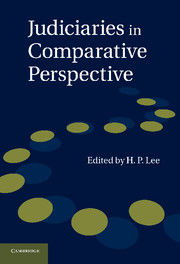Book contents
- Frontmatter
- Contents
- Contributors
- Foreword
- Preface
- Table of cases
- Table of statutes
- Part I
- Part II
- Part III
- Part IV
- Part V
- 20 Judges and non-judicial functions in Australia
- 21 The impact of extra-judicial service on the Canadian judiciary
- 22 Judges and the non-judicial function in New Zealand
- 23 Judges and non-judicial functions in South Africa
- 24 Judges and non-judicial functions in the United Kingdom
- 25 Judges and non-judicial functions in the United States
- Part VI
- Index
- References
25 - Judges and non-judicial functions in the United States
from Part V
Published online by Cambridge University Press: 07 September 2011
- Frontmatter
- Contents
- Contributors
- Foreword
- Preface
- Table of cases
- Table of statutes
- Part I
- Part II
- Part III
- Part IV
- Part V
- 20 Judges and non-judicial functions in Australia
- 21 The impact of extra-judicial service on the Canadian judiciary
- 22 Judges and the non-judicial function in New Zealand
- 23 Judges and non-judicial functions in South Africa
- 24 Judges and non-judicial functions in the United Kingdom
- 25 Judges and non-judicial functions in the United States
- Part VI
- Index
- References
Summary
In the United States, judicial and extra-judicial behavior is governed primarily by the Code of Judicial Conduct, which originally was set forth in 1972 and which subsequently has been adopted in the federal court system as well as in the court systems of all fifty states. Although there are several different versions of the Code of Judicial Conduct, its widespread adoption provides a certain degree of uniformity from jurisdiction to jurisdiction, and forms the foundation for a national body of law concerning the conduct of judges. Each jurisdiction, however, is free to interpret the Code according to its own understanding of it, which allows for some variation in the application of the Code from one court system to another.
In each of the fifty states, there is a judicial conduct commission, charged with enforcement of the Code of Judicial Conduct and invested with authority to discipline judges for Code violations. The decisions of these commissions may be appealed to a court, usually the highest court in the state. In the federal system, judicial councils in each of the thirteen federal judicial circuits are authorized to enforce the Code of Judicial Conduct and discipline judges for Code violations. Council decisions are reviewable by the Judicial Conference of the United States. In addition, many states have official or unofficial bodies that issue advisory opinions concerning judicial conduct. For federal judges, advisory opinions concerning the Code are available through the Judicial Conference of the United States. The American Bar Association also issues advisory opinions regarding the Code of Judicial Conduct.
- Type
- Chapter
- Information
- Judiciaries in Comparative Perspective , pp. 512 - 530Publisher: Cambridge University PressPrint publication year: 2011



